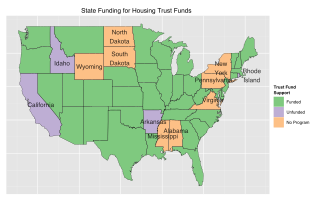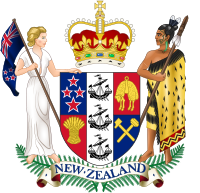The Arts Council of New Zealand Toi Aotearoa (Creative New Zealand) is the national arts development agency of the New Zealand government established in 1963. It invests in artists and arts organisations, offering capability building programmes and developing markets and audiences for New Zealand arts domestically and internationally.
The Fourth Labour Government of New Zealand governed New Zealand from 26 July 1984 to 2 November 1990. It was the first Labour government to win a second consecutive term since the First Labour Government of 1935 to 1949. The policy agenda of the Fourth Labour Government differed significantly from that of previous Labour governments: it enacted major social reforms and economic reforms.
Inland Revenue or Inland Revenue Department is the public service department of New Zealand charged with advising the government on tax policy, collecting and disbursing payments for social support programmes, and collecting tax.

The Third Labour Government of New Zealand was the government of New Zealand from 1972 to 1975. During its time in office, it carried out a wide range of reforms in areas such as overseas trade, farming, public works, energy generation, local government, health, the arts, sport and recreation, regional development, environmental protection, education, housing, and social welfare. Māori also benefited from revisions to the laws relating to land, together with a significant increase in a Māori and Island Affairs building programme. In addition, the government encouraged biculturalism and a sense of New Zealand identity. However, the government damaged relations between Pākehā and Pasifika New Zealanders by instituting the Dawn Raids on alleged overstayers from the Pacific Islands; the raids have been described as "the most blatantly racist attack on Pacific peoples by the New Zealand government in New Zealand’s history". The government lasted for one term before being defeated a year after the death of its popular leader, Norman Kirk.

The Fifth Labour Government of New Zealand was the government of New Zealand from 10 December 1999 to 19 November 2008. Labour Party leader Helen Clark negotiated a coalition with Jim Anderton, leader of the Alliance Party. While undertaking a number of substantial reforms, it was not particularly radical compared to previous Labour governments.
The Fifth National Government of New Zealand was the government of New Zealand for three parliamentary terms from 19 November 2008 to 26 October 2017. John Key served as National Leader and Prime Minister until December 2016, after which Bill English assumed the premiership until the National Government's defeat following the October 2017 government-forming negotiations.
The Canadian federal budget for the 2009-2010 fiscal year was presented to the House of Commons of Canada by Finance Minister Jim Flaherty on January 27, 2009. The federal budget included $20 billion in personal income tax cuts as well as major investments in infrastructure.

Housing trust funds are established sources of funding for affordable housing construction and other related purposes created by governments in the United States (U.S.). Housing Trust Funds (HTF) began as a way of funding affordable housing in the late 1970s. Since then, elected government officials from all levels of government in the U.S. have established housing trust funds to support the construction, acquisition, and preservation of affordable housing and related services to meet the housing needs of low-income households. Ideally, HTFs are funded through dedicated revenues like real estate transfer taxes or document recording fees to ensure a steady stream of funding rather than being dependent on regular budget processes. As of 2016, 400 state, local and county trust funds existed across the U.S.
Non-profit housing developers build affordable housing for individuals under-served by the private market. The non-profit housing sector is composed of community development corporations (CDC) and national and regional non-profit housing organizations whose mission is to provide for the needy, the elderly, working households, and others that the private housing market does not adequately serve. Of the total 4.6 million units in the social housing sector, non-profit developers have produced approximately 1.547 million units, or roughly one-third of the total stock. Since non-profit developers seldom have the financial resources or access to capital that for-profit entities do, they often use multiple layers of financing, usually from a variety of sources for both development and operation of these affordable housing units.

The New Zealand budget for fiscal year 2013/14 was presented to the New Zealand House of Representatives by Finance Minister Bill English on 16 May 2013. This was the fifth budget English has presented as Minister of Finance.
The 2014 Union Budget of India was presented by Finance Minister, Arun Jaitley on 10 July 2014,11 am. This was the first budget of Narendra Modi led NDA government.
The Malaysian federal budget for 2015 fiscal year was presented to the Dewan Rakyat by Prime Minister and Minister of Finance, Najib Razak on Friday, 10 October 2014.
The Canadian federal budget for fiscal year 2017–2018 was presented to the Canadian House of Commons by Finance Minister Bill Morneau on March 22, 2017. The deficit was initially projected to be $28.5 billion, including a $3 billion adjustment for risk. This was later adjusted to $19.0 billion after reflecting a change in the discount rate methodology used to determine the present value of the Government's unfunded pension obligations. The Auditor General's recommendations resulted in revisions to 10 years' worth of budget numbers, which included turning the slim surplus the previous Conservative government left in 2014-15 into a small deficit.
The property bubble in New Zealand is a major national economic and social issue. Since the early 1990s, house prices in New Zealand have risen considerably faster than incomes, putting increasing pressure on public housing providers as fewer households have access to housing on the private market. The property bubble has produced significant impacts on inequality in New Zealand, which now has one of the highest homelessness rate in the OECD and a record-high waiting list for public housing. Government policies have attempted to address the crisis since 2013, but have produced limited impacts to reduce prices or increase the supply of affordable housing. However, prices started falling in 2022 in response to tightening of mortgage availability and supply increasing. Some areas saw drops as high as around 9% - albeit from very high prices.

The Sixth Labour Government has governed New Zealand since 26 October 2017. It is headed by Chris Hipkins, the Labour Party leader and prime minister.

Budget 2019, dubbed the Wellbeing Budget, was the name given to the New Zealand budget for fiscal year 2019/20 presented to the New Zealand House of Representatives by Finance Minister Grant Robertson on 30 May 2019. This was the second budget presented by the Coalition Government. Its release was complicated by the accidental publication of budgetary documents on a test website two days prior to its official release on 30 May, attracting significant media and public attention.

Budget 2020, dubbed "Rebuilding Together", is the New Zealand budget for fiscal year 2020/21 worth NZ$50 billion, presented to the House of Representatives by Finance Minister Grant Robertson on 14 May 2020, the third budget presented by the coalition government of 2017–present. This budget occurs during the COVID-19 pandemic in New Zealand and on the same day that the country exits the lockdown brought about by alert level 3.

Budget 2021 is the New Zealand budget for fiscal year 2021/22, presented to the House of Representatives by Finance Minister Grant Robertson on 20 May 2021 as the fourth budget presented by the Sixth Labour Government. This budget occurs after a year of several lockdowns due to the COVID-19 pandemic in New Zealand and focuses on economic recovery.

Budget 2022, dubbed the Wellbeing Budget 2022, is the New Zealand budget for fiscal year 2022/23, presented to the House of Representatives by Finance Minister, Grant Robertson, on 19 May 2022 as the fifth budget presented by the Sixth Labour Government. This budget was released in the midst of socio-economic impacts of the widespread community transmission of the SARS-CoV-2 Omicron variant, rising living costs, and the 2022 Russian invasion of Ukraine.

Budget 2023, titled "Support for today, Building for tomorrow", is the New Zealand budget for fiscal year 2023/24 presented to the House of Representatives by Finance Minister, Grant Robertson, on 18 May 2023 as the fifth budget presented by the Sixth Labour Government. The budget was released in the midst of rising living costs and recovery efforts following the 2023 Auckland Anniversary Weekend floods and Cyclone Gabrielle in January and February 2023.





